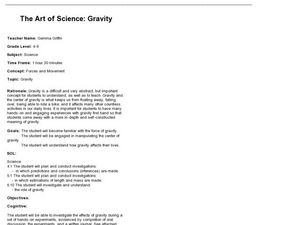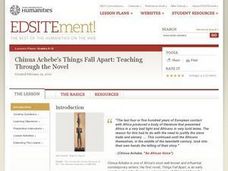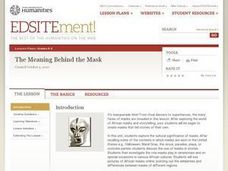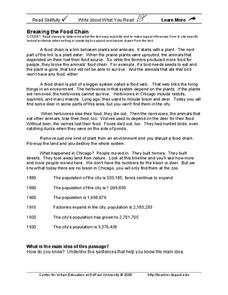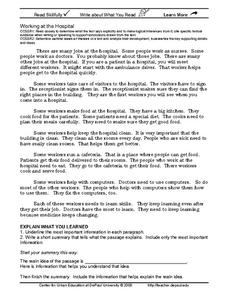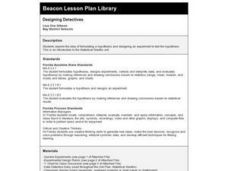Curated OER
Different People/Different Times
Learners read and compare two selections by two different authors with the theme man vs. nature. They complete a literary analysis paper comparing and contrasting the author's treatment of the topic with emphasis on setting, historical...
Curated OER
The Tell-Tale Heart
Readers listen and critically read fictional prose to answer prediction questions at designated stopping points, and then they give a summary of the short story. This lesson is ideal for English language learners developing English...
Curated OER
“Pardon This Interruption-Columbus Has Landed!!!”
Students research, design, rehearse, record, and present a 60 second Public Service Announcement, based on Columbus' arrival in the America. The students, working in groups, utilize the design process in creating their PSA. This lesson...
Curated OER
Reading Examples
Young writers read excerpts from Gary Paulsen's memoir to identify figurative and literal language that contain sensory details. They determine which selections are examples of sensory language and fi the language is used literally or...
Curated OER
Protective Design
Over 3 or 4 class periods your young designers will create a wearable garment that provides some sort of protection from a danger in everyday life. In this fashion design lesson, students investigate fear in our society and brainstorm...
Curated OER
The Art of Science: Gravity
Through a series of experiments and demonstrations, fifth graders will learn about gravity. They will make predictions, drop various objects, write down their observations, and try to understand gravity through balance. This lesson seems...
Curated OER
Which Fish Where?
Here is a activity outline that prompts elementary students to graph and analyze data regarding fish caught along the Hudson River. They will review vocabulary and complete 2 worksheets which can be accessed by clicking on the provided...
Southern Nevada Regional Professional Development Program
Common Core Reading Standards: Understanding Argument
What does your class know about logical fallacies? They can find out quite a bit and practice identifying logical fallacies if you follow the steps and use the resources provided here! After reviewing ethos, pathos, and logos, ask small...
Walters Art Museum
The Symbolism of Allegorical Art
Introduce learners to allegorical art with four bronze sculptures by Francesco Bertos. After modeling how to recognize bias and allegory in Bertos' Africa, class groups examine the other three sculptures in the series before creating...
9/11 Memorial & Museum
Exploring Afghani Culture through Literature
Hosseini Khaled's The Kite Runner and A Thousand Splendid Suns are the anchor texts in a semester-long course that explores Afghani culture and traditions.
Kenan Fellows
Determining Stream Health by the Diversity and Types of Benthic Organisms
How diverse are the benthic organisms found in local streams? Using the information learned in previous lessons on identification of macroinvertebrates and on calculating stream index values, groups determine the health of local...
Curated OER
Chinua Achebe's Things Fall Apart: Teaching Through the Novel
Students are introduced to Chinua Achebe's first novel and to his views on the role of the writer in his or her society. It can be used alone or in conjunction with the related lesson Chinua Achebe's Things Fall Apart.
Curated OER
The Meaning Behind the Mask
Young scholars explore the world of African masks and storytelling. They create masks that tell stories of their own.
Curated OER
Unicorns, Dragons, and Other Magical Creatures
Pupils exoplore the world of imaginary creatures (dragons, unicorns, etc.) They discuss the creature's special attributes and read stories about them. They create their own magical creatures in the form of puppets.
Curated OER
Michelle Kwan: Heart of a Champion
Who is a champion to your class? Elementary and middle schoolers think of a role-model from their lives. Then, in their journals, they write evidence of that person's perseverance. They identify the character trait of perseverance with...
Curated OER
Space Food
What do astronauts eat in outer space? Kids can read an informational passage to learn about space food. The passage includes prompts that have learners identify the main idea and key details, then write a paragraph summarizing the text....
Curated OER
Today’s Telephone
Does your class know the history behind today's telephone? They will after reading a very interesting one-page informational passage. They'll learn all about the way phones have progressed to the amazing devices they've become as they...
DePaul University
Breaking the Food Chain
Throughout history, the growth of big cities has resulted in the destruction of ecosystems. In the case of Chicago, IL, a grassland that was once home to bison, deer, wolves, and foxes quickly became a booming city of over three million...
DePaul University
Settlement
Early settlers in the American Midwest experienced constant struggle. This reading passage describes for young learners the hardships of homesteaders as they journeyed west and sought to start a new life. When finished, students identify...
Curated OER
Working at the Hospital
Having this reading passage handy to assess your learners' ability to process written text, practice summary with your class, and improve reading comprehension. This passage is about the people who work at the hospital. Learners read...
Polk Bros Foundation
I Can Compare and Contrast
Work with your class to fill out this Venn diagram. Pupils can compare and contrast any two things and then write a short paragraph about the relationship demonstrated in their diagram.
Polk Bros Foundation
I Can Locate and Classify Information About a Topic
After reading a text, ask your pupils to recall and organize what they've just learned into a blank three-column chart. Class members write the topic and fill in the columns with information. The sheet also prompts students to write a...
Curated OER
Backyard Critters
Students explore the characteristics of invertebrates in their backyards. They observe, describe, and classify specimens. They conclude with a "snail race."
Curated OER
Designing Detectives
Third graders explore the idea of formulating a hypothesis and designing an experiment to test the hypothesis.





